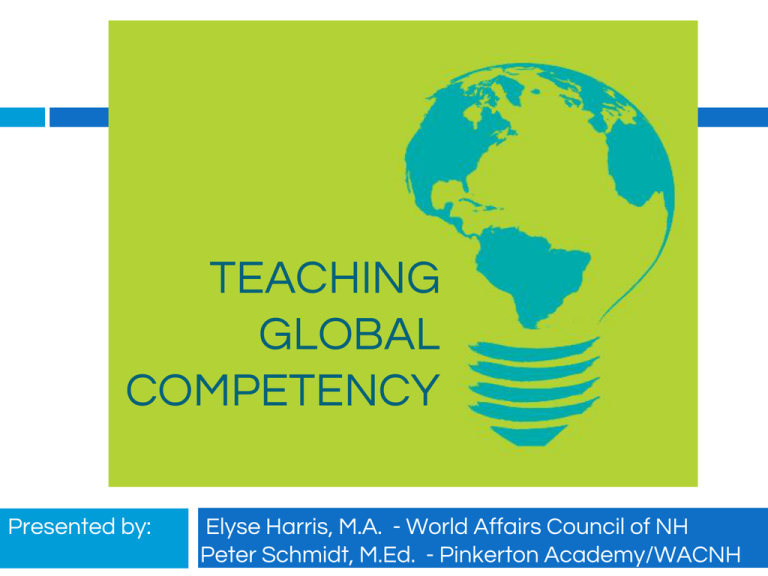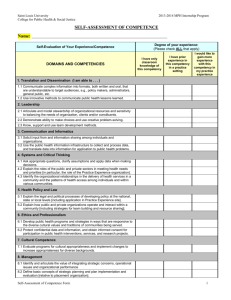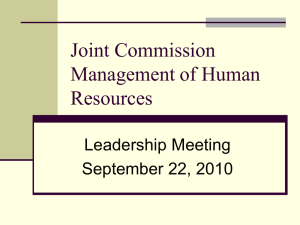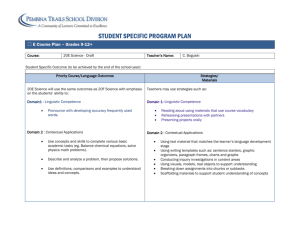TEACHING GLOBAL COMPETENCY - World Affairs Council of New
advertisement

TEACHING GLOBAL COMPETENCY Presented by: Elyse Harris, M.A. - World Affairs Council of NH Peter Schmidt, M.Ed. - Pinkerton Academy/WACNH Our Changing World An invitation to ponder… Moving toward Global Competency 1. What is Global Competence? ◻ 2. The Need for Global Competence ◻ 3. Global Competency in Action ◻ 4. Global Competence Beyond the Classroom ◻ What does “Global Competence mean in today’s society?” Knowledge and Skills about the World and Globalization Internationally Competitive Curriculum World Standards Labor Force with High Levels of Educational Attainment 1. What is Global Competency in Education? Possession of the knowledge, skills, and disposition to understand and act creatively on issues of global significance. Global education seeks to make students competent in investigating the world, recognizing perspectives, communicating ideas across diverse audiences, and taking action to improve conditions globally. Source: The Asia Society So...great...another new educational initiative!!?? No! Global Education is NOT... ◻Some politically-driven agenda ◻Telling students how or what to think ◻Focusing exclusively on the global conflict ◻An extra subject to cram into curriculum ◻About raising money for charity Ok, so what is it really? Global Competence is nothing new! Just a shift in perspective and focus! It looks like this…. A closer look…(The Global Competencies) ◻ Investigate the world beyond one’s own immediate environment, framing significant problems and conducting wellcrafted and age-appropriate research. ◻ Recognize perspectives, others’ and one’s own, while articulating and explaining such perspectives thoughtfully and respectfully. ◻ Communicate ideas effectively with diverse audiences, bridging geographic, linguistic, ideological and cultural barriers. ◻ Take action to improve conditions viewing oneself as a player in the world and participating reflectively. 2. The Need for Global Competency On a Global Scale Today’s global problems aren’t just someone else’s problem. What happens here affects other countries and vice versa. Ex: 2011 Tsunami in Japan (Toyota) Today’s problems are: Are complex, interconnected, and borderless ◻ Global/Local causes ◻ Global/Local consequences ◻ Today’s Problems… ⬜War/Terrorism ⬜Refugees ⬜Climate change ⬜Global health ⬜Internet freedom ⬜Human/Workers’ Rights ⬜Global economics…and more others Our students need to understand that they are not just citizens of the United States; they are a citizens of the WORLD. Are our students ready for the future? ◻Fewer than 10% of our college and university students study abroad. ◻2/3 of young adults in America can’t find Iraq on a map. ◻3/4 think English is the most widely spoken language on the planet. ◻…Yet 93% of Americans believe international knowledge is important. Source: Asia Society and World Savvy What do the HS graduates think? Source: worldsavvy.org 3. Global Competency in Action Bringing Global Education into your classroom and curriculum Getting started...some key resources: Preparing Our Youth to Engage the World (Especially pg. 70-75 and Matrices) Globalocity: Global Education Guide Implementing Global Competency - Practically! PRIME STAGE P – PLC Use the professional learning communities to discuss/share pedagogy, content, and curricular ideas. R – Research/Investigate globally-focused content to implement into lessons I – Implement global lesson plans/activities PRIME ….continued M – Monitor/Measure progress of lesson – self/student input/feedback, reevaluation with PLC, admin support. E – Educate students, colleagues, administrators about how you are bringing a global perspective to lessons. STAGE Student Choice – Are there options for students to make choices about content, process, or product? Voice and Choice! Technology Use - Do students have adequate technology to collaborate? Authentic Work- Are students being asked to do something adults do in the “real world.” STAGE….continued Global Significance- Are students completing the four global competencies? Exhibition to audience- Will students have the opportunity to present their knowledge to an audience. Unpacking a globalized lesson with state standards 1. Choose a standard Example: CA11.2.3 Trace the effect of the Americanization movement. 2. Consider ways to integrate global education into the standard • Students can examine narratives, articles, readings and films related to a cross-cultural historical event (example: American Nativism) and determine the perspectives. 3. Plan specific lesson plan modifications •To investigate the world and recognize perspectives, students can examine the perspectives of “nonnatives” coming to/living in the United States. •To further student understandings, students can view film clips, documentaries, and work with news articles to compare and contrast what they learn about American Nativism to other current and historical nativism examples in the world. i.e. Africa, Middle East, the Balkans. 4. Determine how students will communicate and take action with their learning To take action, students can take the “Pledge to End Racism” via the Runnymede’s End Racism This Generation website: www.end-racism.org/pledge/ or set up an anti-racism campaign/pledge at school. • Students can also communicate in a myriad of ways: reflections, debates, role playing, presentations, etc. • Have students connect via social media with other students in the world to share thoughts/gain insight Digital Learning in Global Education http://globalocityeducation.weebly.com/digital-learning.html 4. Beyond the Classroom: Ideas & Activities Getting Globalized… ◻General ◻Curriculum ◻Project-based Learning ◻For Students ◻For Teachers http://globalocityeducation.weebly.com/international-projectbased-learning--other-activity-ideas.html Teachers for Global Classrooms Fellowship More information about TGC Fellowship at my website Start a discussion…start a global movement ◻Starting a Global Education Program ◻Global Ed Committee/Global PLC ◻Implementation Strategies http://globalocityeducation.weebly.com/leading-global-education.html Global Community Resources and other NH/Boston universities and other Boston consulates The World Affairs Council of NH ◻ Mission: To promote the widest possible understanding of world affairs among the citizens of New Hampshire. ◻ The state’s only non-profit, non-partisan organization fostering learning, discussion and citizen involvement in world affairs since 1954. WACNH Programs Speaker series; ◻ International film and discussion series; ◻ International Visitor Program in partnership with the U.S. State Department; ◻ Teacher workshops; ◻ Model UN conferences; ◻ Academic World Quest competition; ◻ Academic World Quest ◻for NH High School students ◻a team competition ◻tests knowledge of international affairs, geography, history, and culture ❏10 rounds of multiple choice questions on critical global issues. ❏A study guide is provided with detailed resources on each of the categories Academic World Quest 2016 Competition ◻February/March ◻3 hour competition ◻@ Southern NH University CATEGORIES: ● Current Events ● NATO ● Asia Matters for America ● International Trade and Finance ● Privacy in the Digital Age ● The Arctic ● Food Security ● Organization of American States WACNH as a Resource We want to help you globalize your classroom! Speakers, International Visitors, Documentaries, Model UN Workshops & more. Visit our website and join our mailing list for the most up-to-date opportunities. Some closing words... Questions? Email & Resource Information: Peter Schmidt p.t.schmidt@hotmail.com Elyse Harris eharris@wacnh.org Global Education Resource Guide: http://globalocityeducation.weebly.com/ Resources from presentation: http://wacnh.org/Educator-Resources







